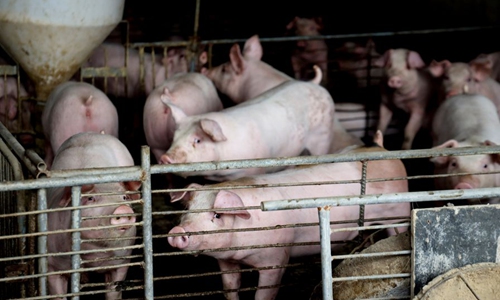
Pigs are seen at pig farmer Chang Xianyun's pigsty in Neixiang County, central China's Henan Province, Nov. 27, 2019. (Xinhua/Lu Yun)
Analysts and pig farms in southern China have warned about possible African swine fever (ASF) infections among pigs as incessant downpours continue to wreak havoc and some rivers exceed their limits, but they said any outbreaks won't be widespread.
As floods have swallowed up some pig pens in South China's Guangxi Zhuang Autonomous Region and Guangdong Province, and East China's Jiangxi Province, where heavy rains pushed local rivers and lakes to keep rising, experts reached by the Global Times said there is a possibility of regional ASF infections among pigs but a widespread return of ASF is unlikely.
According to videos circulated online, pig pens in a rural village of Jiangxi were flooded, forcing live pigs to float on the water.
Sharing mangers among pigs was one of the main reasons why ASF could spread widely among the animals. Now, the boundaries among mangers and pig pens would be broken due to floods caused by heavy rainfall, Zhu Liang, an agricultural products analyst at Shanghai-based Chaos Ternary Futures, told the Global Times.
Pigs are infected mainly through making contact with sick pigs or contaminated feed, drinking water and food residue. When infected pigs are found they would be culled and their bodies would be rendered harmless through treatment or buried, according to the Chinese Center for Disease Control and Prevention (CDC).
The ASF that swept across China between 2018 and 2019 was basically brought under control. But since there is no vaccine or treatment for ASF, the disease is mainly controlled by preventive measures, such as avoiding the use of swill to feed pigs, and by separating healthy pigs and sick ones, said the CDC.

People take a raft on flood water in Rongshui Miao Autonomous County of south China's Guangxi Zhuang Autonomous Region, July 11, 2020. On July 11, the water level of the Rongjiang River in Rongshui County reached 111.87 meters, 5.27 meters above the warning line. (Xinhua/Huang Xiaobang)
Because pigs carrying the virus can survive for a long time in the environment, and the virus is found in their blood, feces and tissues, healthy pigs will be infected if the surrounding water is contaminated, an expert on veterinary studies at the China Agricultural University told the Global Times on Sunday.
As an old Chinese saying goes, after a major disaster, there will be a major epidemic. Experts said that is because long ago, viruses that infected poultry and livestock could be washed away by floods without being given timely harmless treatment, so they could contaminate the water and infect other live animals.
But now, Chinese farms and authorities are closely watching for signs of any epidemic among livestock, including ASF. In addition, as heavy floods will dilute the virus, the risk of an ASF outbreak in China due to flooding is low.
The veterinary expert, who refused to be identified, suggested when the flooding receded, hog farms should raise their monitoring for ASF infections. "Timely disinfection will help contain ASF spread."
In a lengthy technical guidance issued by the Ministry of Agriculture and Rural Affairs on July 6, it warned hog farms in southern China to closely monitor the living environment for pigs, sanitize piggeries and neighboring environments after rain, and acidify and disinfect water that may be contaminated.
As the heavy rainfall in southern China continues, a general manager of a big hog farm in Zhongshan, Guangdong, surnamed Qian, confirmed to the Global Times on Sunday that it is possible floods could inundate hog pens, but the current amount of rainfall would not pose this threat.
He noted that his farms, on which about 150,000 live pigs are raised, have been strengthening their monitoring for ASF infections.
ASF preventive measures, such as disinfections of pigs, workers and farm environment regularly, would prevent pigs from getting infected, Qian said.


